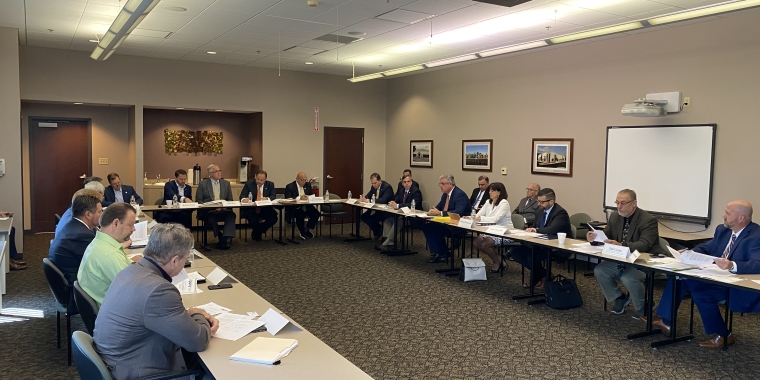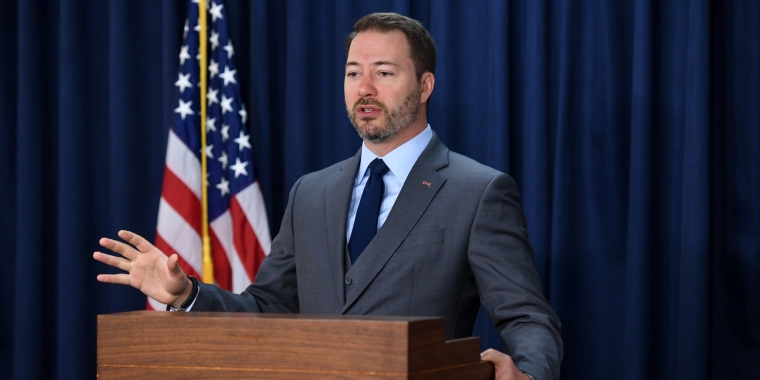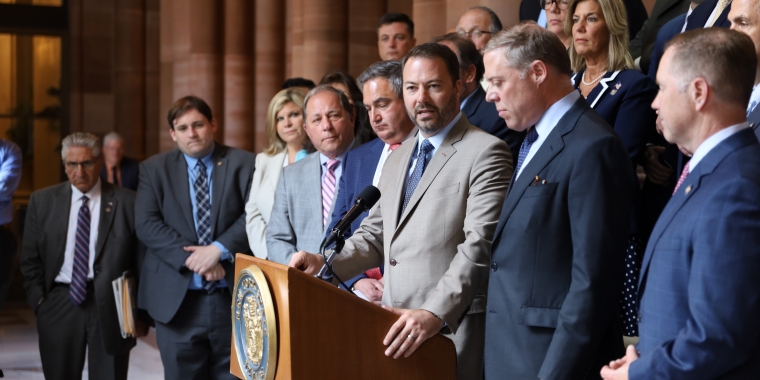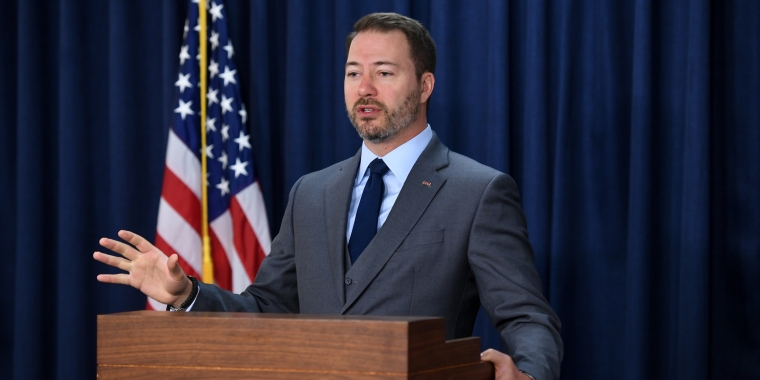
Senate Republicans Blast Democrats for Abandoning Small Business, Again
Robert G. Ortt
May 27, 2020
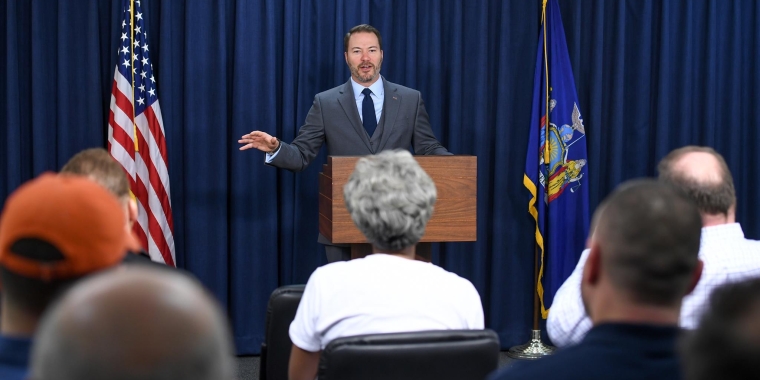
Albany – Today, New York State Senate Republicans blasted Democrats for refusing to assist businesses overwhelmed by the COVID-19 outbreak and economic shutdown. The Legislature convened for the first time since the last week of March – in the midst of the COVID outbreak – to pass a wide array of legislation, with no relief for small businesses struggling to open or reopen following the government’s shutdown of the economy.
Senator Rob Ortt (R,C,I-North Tonawanda) said, “Our small-business owners, farmers, employees, and taxpayers are in the fight of their lives, so it strikes me as unconscionably tone-deaf that Democrats would ignore them. Millions of residents and scores of small businesses were already leaving our state – well before the virus and government lockdown destroyed our economy. We can’t reopen our doors, we can’t get people back to work, and we can’t fund vital government services if we don’t discuss the insurmountable costs New York imposes on its job creators.”
Senator Pam Helming (R,C,I-Geneva) said, “Whether it is agriculture, manufacturing, main street retail stores, healthcare, education, local government, or our important tourism industry, every sector has been hit hard by the COVID Pandemic. Local businesses are at or past their breaking point. And the burdens associated with the pandemic are in addition to the already high cost of doing business in NYS. As legislators, we have a real opportunity to improve the current business climate. This begins by setting aside partisan politics and providing much needed relief to small businesses, schools and our healthcare providers so they can safely re-open. Unfortunately, the recent package of bills put forward by the majority members does little to help job creators and their employees. But it is not too late for the majority to reverse course and bring Republicans and Democrats together to deliver real relief to get our economy moving again and people back to work.”
Senator Tom O'Mara (R,C,I-Big Flats) said, “Many small businesses across the region I represent and statewide have been devastated by this pandemic. We know it is going to require a steady and sustained effort, at every level of government, to help this foundation of our local economies find solid ground again. The Phase Two reopening starts on Friday, yet the Cuomo administration still has not provided a detailed list of what types of small businesses will be allowed to reopen in order to give them time to get ready. Now the Legislature's return to session this week is noteworthy for its lack of any meaningful mandate, regulatory, or tax relief for small businesses. In our individual discussions with many small business owners and local economic development leaders, we understand the overall state-level strategy that is going to be necessary. The governor and legislative leaders are missing opportunities to start taking steps toward a broader and faster economic recovery.”
Senator Daphne Jordan (R,C,I-Halfmoon) said, “Between Governor Cuomo shutting down our economy that's caused a massive economic crash and record unemployment, and the Senate Democratic Majority failing to advance any pro-small business legislation, the Democrats in Albany are more interested in playing politics than helping people. While today’s Senate Session was a huge missed opportunity to enact a small business support package, the best small business stimulus would be for Governor Cuomo to finally wake up and re-open New York. Albany must get out of the way of job creators by enacting real regulatory relief so small businesses can spend their time and energy reopening and rebuilding, not filling out government paperwork. Given the severity of our economic crisis, we should rethink every spending category and reform Albany’s archaic regulatory structure. We need to unleash the biggest economic comeback in American history so our small businesses can get back to business and folks can get back to work.”
Senator George M. Borrello (R,C,I,LIBT-Sunset Bay) said, “The latest unemployment figures from the state Labor Department confirm what we feared: New York State is facing the greatest economic crisis of modern times. With 1.8 million jobs lost during the shutdown and a staggering 14.5 percent unemployment rate, our state needs its leaders to step up to the plate with solutions that will help stabilize our economy, help our hardest-hit small businesses and get New Yorkers back to work. Disappointingly, this week’s Senate calendar lacks any proposals to advance these goals and start rebuilding our broken economy. However, myself and some of my colleagues have introduced a host of innovative and critically-needed small business relief bills that, collectively, represent the lifeline these employers need right now. I urge the Majority leadership to move these essential measures to the top of the Senate's agenda.”
Senator Chris Jacobs (R,C,I-SD60) said, “Besides the tragic loss of life, the most significant amount of harm caused by this pandemic has been to the small businesses of New York State and the residents they employed. Given the devastation they have suffered it is unconscionable to me that in the first week back in session the majority will not consider a single piece of meaningful legislation providing small business relief. By failing to do so they are now contributing to our steep economic decline.”
Senator Jim Tedisco (R,C,I-Glenville) said, “Even before the pandemic, New York’s economy was floundering. As we safely reopen New York’s beleaguered economy so people can go back to work and help small businesses, which have been hammered during this crisis, rebound, we don’t want to go back to the old economy where 189,000 people last year and over 1.4 million in the past decade left the state. That’s why we need to shine a bright light on this elephant in the room to stop the massive exodus of New Yorkers who have fled our state by reversing the failed agenda which has helped cause this incredible population loss, otherwise the Empire State will fast become the Empty State.”
Senator Rich Funke (R-C-I, Fairport) said, “The economic shutdown associated with the pandemic has left our small businesses hurting and looking for answers. Instead of proposing solutions to help them the Senate Democrats are taking up a bill to let more dangerous criminals out of jail using COVID-19 as an excuse. Small businesses are the life blood of our upstate communities and it's time Albany lent them a hand rather than delivering another punch to the gut.”
After talking to small business owners across all sectors and regions of the state, varying in size, several consistent themes emerged. They pointed to important federal assistance, past, and present, but they also identified concerns specific to New York State government. Among them:
- Expand Nourish New York. The program connecting the state’s prominent agriculture industry with emergency food shelters has been a rare economic success and a moral triumph. It should be replicated and expanded to connect the state’s farms with downstate markets, which will reinforce New York’s supply chain, improve healthy food options, and stimulate the economy.
- Lower the cost of doing business. In New York, labor is the principal cost-driver for businesses. Wage requirements, especially statewide, hurt small businesses and should be postponed. In addition, tax and wage deductions should be considered to stimulate growth and hiring.
- Reduce non-health, non-safety regulations. New York’s notorious regulatory environment forces businesses to incur excessive costs and delays, which discourages growth for current and prospective employers. Ill-conceived bans on plastic bags, polystyrene, and other products not only increase costs but also create public health concerns.
- Address budget/policy uncertainty. Many businesses and municipalities are struggling to forecast their next steps simply because so much uncertainty surrounds how they will be impacted by state spending, tax, and policy decisions.
- Fix unemployment. The struggles of DOL to issue unemployment benefits to recipients has been well-documented. In addition, concerns abound regarding if employees will return to work if federal and state benefits and policies incentivize them to stay home.
- Protect Small Business Landlords. Many small business owners and farmers utilize their properties to rent, which provides critical income while also expanding housing options in small communities. They should not be vilified or classified as corporate landlords.
The lawmakers also pointed to specific legislation they believed should be advanced to help small businesses. The legislation, sponsored by both Republican and Democrat legislators alike, included:
S. 5954A (Kaplan) - Tax relief for small businesses
S. 8231 (Carlucci) - Blocking COVID claims from harming experience ratings
S. 8319 (Akshar) - Business and municipal grants
S. 8249 (Helming) - Blocking COVID claims from harming experience ratings
S. 7043 (Borrello) - Tax credit for hiring first employee
S. 681 (Ortt) - Red Tape Reduction Act
S. 4671A (Kaplan) - Eliminating the corporate franchise tax for manufacturers
Ortt and Republican lawmakers have held discussions with hundreds of small business owners, employees, and advocacy organizations to develop a Reset Plan for New York’s economy and government operations. The four prongs – reopen, reduce, reform, and revitalize – will provide short and long-term solutions to help New York’s businesses reopen and grow as well as recommendations to change the state government’s role in the economy.
In reopening, they called to eliminate the one-size-fits-all approach of the early pandemic response and to instead adopt a regional approach to reopening the economy, which has since been implemented. They advocated for the swift, but safe, reopening of all construction, manufacturing, and agriculture-related industries to help them avoid season-sensitive timelines. In working with state agencies to provide clarification on questions pertaining to essential designations and respective opening phases, they identified and called for the elimination of red tape prevalent earlier in the pandemic. They also called for New York to align the businesses on Empire State Development’s essential list with that of the Federal government’s essential businesses list to ensure continuity and reopen the economy in phases as public health milestones are met.
###
Share this Article or Press Release
Newsroom
Go to Newsroom